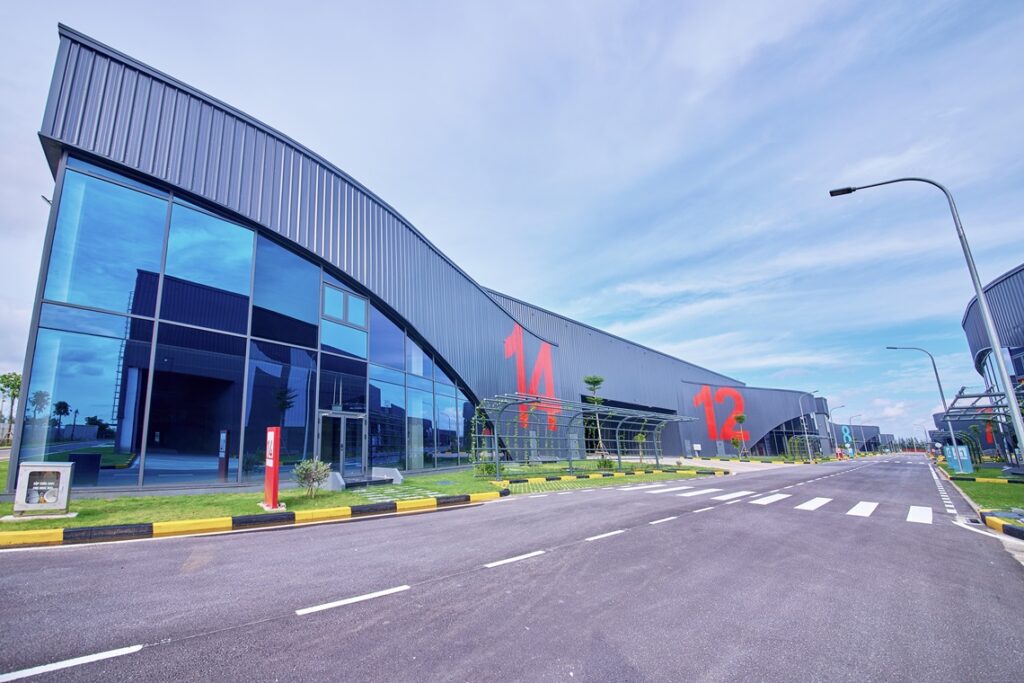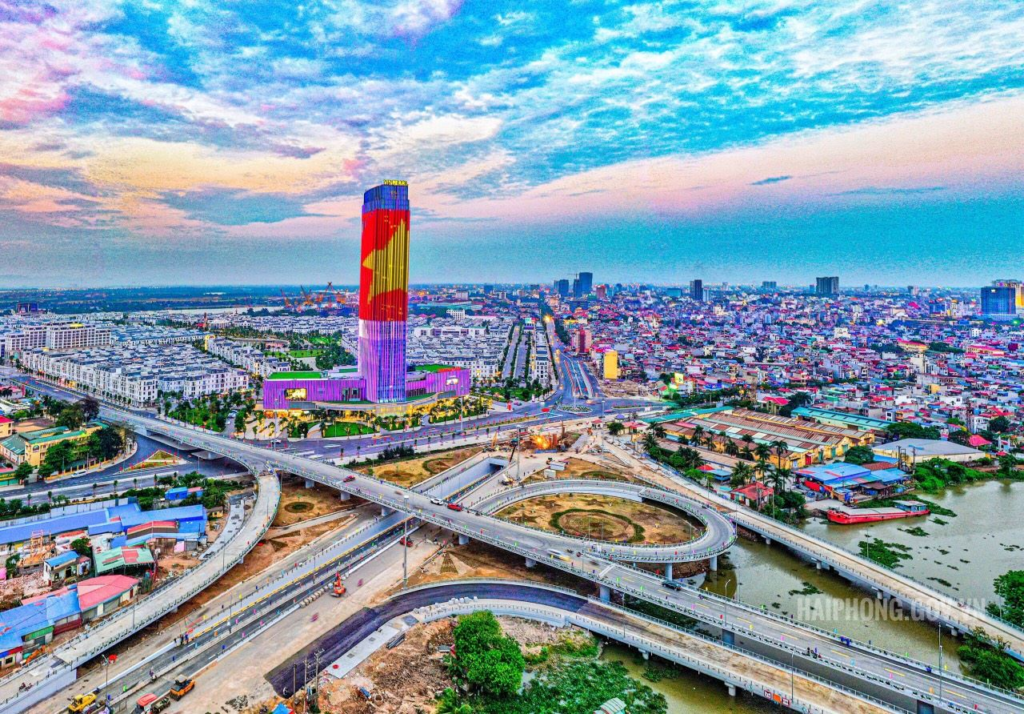Vietnam is becoming the epicentre of industrial activity and is offering a multitude of industrial for rent in Vietnam. For nonresident investors, leasing it is a complex but valuable process. This tutorial explores some of the best practices for reduction of the leasing process, to ultimately ensure an easy launch for activities and to maximize gains from the advantages that may be realized. By virtue of understanding the process, investors can safely acquire the appropriate industrial for rent in Vietnam as needed.
1. Understanding the Types of Industrial Spaces Available
1.1. Ready-Built Factories

Turnkey factories are the ideal solution for tenants who always want to start production immediately. There is a built-in infrastructure, including the essentials like electricity and water etc, making it much faster than configuring ones setup for the first time. For those investors looking industrial for rent in Vietnam, it is a very good option.
However, the normalized factory design is not appropriate to most industries’ needs. Firms involved in the production of custom equipment or facilities may run into limits. It is necessary to determine the space’s negotiability before entering into a lease contract.
For example, a food production specialist tenant may require special temperature adjustment, which can lead to an additional cost of customisation. Off-the-shelf factories are best suited for highly rating speed over flexibility, as well as for industries including textile or electronic assembly.
1.2. Warehouses
Warehouses can be an adaptable solution for storage and distribution companies. Tenants have access to high quality logistics infrastructure and to lower transport costs which they are granted, if they rent an industrial zone warehouse.
Industrial for rent in Vietnam in these areas is usually provided with a large number of loading docks, high ceilings and secure buildings. Investors who wish to create regional supply chains use warehouses for their space and accessibility, so that they can be operated effectively.

But investors should evaluate the space’s capacity and increase in size. For example, companies that are growing at a high rate may want to be able to increase the amount of storage they require without moving. Warehouses are an ideal setting for the logistics and e-commerce industries looking for geographically advantageous sites close to ports or highways.
1.3. Build-to-Suit Spaces
Build-to-suit spaces cater to businesses with specific operational needs. Rather than “off-the-shelf” factories, these environments enable users to custom-design layouts, equipment, and utilities to be built on site. This modality is highly in demand in the market of the industrial for rent in Vietnam.
In the instance of, for example, an automotive component manufacturer, it could be desired to provide assembly lines custom-built to a build-to-suit arrangement. Furnishings for tenants can then be used by tenants in their work workflow, in turn improving workflow and production efficiency.
One of the major issues in regard to build-to-suit leases is the long construction and approvals process. Specifically, however, compromising for special needs is constantly prioritized over compromising for time. That approach is appropriate for the high or special purpose of manufacturing industry.
2. Researching the Right Location
2.1. Proximity to Key Infrastructure

Selecting a site with good connectivity is an important factor for industrial purposes. Tenants are generally trying to lease industrial for rent in Vietnam close to ports, airports, or highways. In Hai Phong, for example, adjacency to seaports guarantees ready market access for the seaports’ products.
Ease of access to transportation terminals shortens lead times, so companies can meet delivery and schedule constraints. This is particularly important for tenants in the logistics and export industries. Investors should also pay attention to the availability of local vendors/labor pools when assessing sites to maximize the operation.
2.2. Top Industrial Zones in Vietnam
Industrial zones in Hai Phong, Quang Ninh and Hung Yen are booming thanks to their strategic location and favorable infrastructure. Tenants in these zones benefit from modern facilities, tax incentives, and streamlined administrative procedures.

For example, industrial parks in Quang Ninh offer excellent road and port connectivity, making them an attractive option for businesses exporting goods to neighboring countries. In the meantime, with the proximity of Hung Yen to Hanoi, distribution facilities from Nothern market to Central market and to Southern market are very convenient, making Hung Yen an ideal location for distribution centers.
2.3. Key Decision Factors
Investors have to take account of a variety of criteria in choosing a site, such as rental fees, availability of utilities and potential for long-term growth. For example, businesses considering an expansion they will be setting up in targeted zones need to focus on regions that have scalable and attractive infrastructure.
Another important consideration is environmental regulations. In the setting of chemical production, for example, tenants of an industrial site should guarantee compliance of the site with local as well as international environmental regulations. By making use of extensive research, investors are eligible to acquire industrial for rent in Vietnam which match their strategic needs.
3. Key Legal Considerations for Leasing in Vietnam
3.1. Land Use Rights

Legal counsel are crucial for identifying and employing effectively in accordance with Vietnamese law and regulation, for foreign investors. They are of great significance in the process of ensuring the industrial for rent in Vietnam‘s tenancy, validating the lease agreements and getting the relevant permits for the industrial operation. These professionals also support tenants to achieve lease terms that are favourable to their business, but with minimal risk.
By being able to access tips from experienced lawyers and advisors, tenants can proceed to give themselves an understanding of the technical legal landscape in a way that will avoid costly mistakes. Through detailed instructions for each phase in the leasing process, they enable them to achieve efficiencies that lead to a smoother entry into the Vietnamese industrial landscape as well as sustained business operation.
3.2. Understanding Lease Agreements
Lease agreements in Vietnam can differ widely based on the geographic area and landlord. Input vocabulary, to assist clarification of, are terms renting charges, cost of maintenance, and reserves for future growth.
Foreign investors should make sure that the agreement contains provisions of disputes resolution to prevent likely disagreements. Experience working in Vietnam’s industrial sector (for example, by very senior legal personnel) can assist to resolve these issues in a focused manner.
3.3. Engaging Legal Consultants

Legal advisors are of great value in advising foreign investors on Vietnamese laws and regulations. They offer very important assistance for the confirmation of industrial for rent in Vietnam‘s regime of ownership, in confirmation of lease conditions, and in the capture of any necessary permissions for the running of activities. These specialists support tenants as well in reaching lease conditions which are in balance with the business intentions, and yet try to avoid potential risk.
By working together with established legal advice, tenants gain the ability to better utilize complex legal structures and protect against costly mistakes. Through providing assistance during the leasing stage they also optimize their own workload, thus creating a smoother transition to working in Vietnam’s industrial sector, a process that facilitates long term business viability.
4. Working with Reliable Leasing Consultants or Brokers
4.1. Role of Leasing Consultants
Leasing consultants are essential to foreign investors looking industrial for rent in Vietnam. These professionals help identify suitable properties, negotiate terms, and facilitate communication with landlords.
Consultants, due to their deep expertise, are well-poised to line-up tenants to units that are appropriate for their requirements. For example, they can recommend spaces near Quang Ninh’s industrial hubs for businesses focusing on exports.

4.2. Verifying Broker Credibility
Reliable brokers are a critical component to mitigate possible ones. Tenants are strongly advised to check that of a broker’s qualifications, past performance, and memberships in industry associations prior to entering into any contracts. The broker must be shown to have historical evidence of being able to deliver on his/her commitments and to manage transactions efficiently.
However, to facilitate their confidence, tenants can refer to references from previous clients to verify the broker’s reliability and professional manner. Because this rigorous vetting process will help create a safer, more secure leasing experience that will minimize the chances of miscommunications or things turning sour at a later date. Involving reliable brokers builds confidence and provides peace of mind throughout the leasing process.
4.3. Benefits of International Property Consultants
Foreign investors sometimes benefit from cooperating with international property advisors with an understanding of Vietnam’s industrial real estate market. These consultants provide the following array of services related to the streamlining of the leasing process, such as site selection advice, market research and contract negotiations. Deep understanding into local laws and policies, sector developments, and industrial for rent in Vietnam choices guarantees investors can take informed decisions and reduce risks.
Based on these companies’ expertise, foreign investors can better understand and overcome the challenging aspects of the Vietnamese market, leading to a smoother and better leasing process.

5. Negotiating Lease Terms Effectively
5.1. Clarifying Key Terms
Lease contract should, among others, precisely stipulate all the key elements of the contractual partnership such as the rate of rental, maintenance charges, and supply of utilities in the rent etc. Transparency is crucial to avoid any hidden costs. In looking for industrial for rent in Vietnam, the thing to remember is that every clause of the lease should be recorded so that there are no hidden surprises. It is of great importance to verify the rent, service fee, and utility fee terms at the beginning. Carefully reviewing the agreement as well as the ambiguous conditions with the landlord can protect a tenant from surprise charges and facilitate a pleasant leasing experience.
5.2. Strategies for Favorable Terms
Negotiating is one of the crucial steps to achieve, if not the best, lease terms and conditions. Tenants can request various incentives to improve their lease conditions, such as reduced rental rates during the initial months or allowances for industrial for rent in Vietnam customization to meet specific business needs.
The request to have an extension on payments because rent is due is a common exchange strategy that saves the companies from immediate financial commitment. Using these motivations, tenants are able to provide a more positive climate in which to initiate a business and maintain the ability to adjust to the financial pressures and operation flexibility that face them in the critical early days of running their business.

5.3. Dispute Resolution Clauses
Dispute resolution clauses in rental contracts constitute an insurance for tenants in that they prevent potential disputes from becoming a problem. These clauses usually specify procedures, e.g., arbitration or dialogue, whereby disputes can be settled in an amicable yet sensible manner.
Resolution of conflicts is achieved by defining steps for when conflict arises like provisions in the case of disagreement, these clauses prevent disputes as well as costly litigation. This ensures that disputes can be resolved efficiently without making the problem worse. Ultimately, having such provisions helps create a more symbiotic landlord-tenant relationship that, in turn, makes negotiation of the lease-to-lease relationship smoother and enjoys a better long-term tenancy experience.
6. Managing Cultural and Language Barriers
6.1. Overcoming Language Differences
Language problems can be introduced by the lease negotiation process and exacerbate tenants’ ability to fully understand the scope and conditions of the lease. In this, tenants have to interact with anantlingual officers or professional translators in order to ensure the right interpretation. In particular this is important for foreign investors, who are not necessarily familiar with the Vietnamese legal terms that are applied to leases.
The principles are guarded against errors and misunderstanding by the presence of a translator or bilingual expert, ensuring that nothing is left to chance and each clause of the lease is clear and valid in law. The proactive approach is applied to help with the negotiation process and to safeguard the interest of the tenant in the future.

6.2. Understanding Vietnamese Business Etiquette
Cultural awareness is a major contributing factor in developing landlord and local authority trust. Respect towards local customs and local traditions must be demonstrably shown during negotiations in order to foster good relations.
Knowledge and understanding in relation to Vietnamese cultural behavior, for example, can serve to make a good impression, which in turn can lead to goodwill and cooperation. This sensitivity shows that you care about the local population and this may, in the hope, lead to more satisfying relationships and positive results.
Having an understanding of social norms, modes of communication, and nonverbal behavior is also critical for reducing communication errors and for a more productive, efficient and smooth interaction with Vietnamese colleagues. Consistently, cultural sensitivity builds lasting, deep trust, and good relationships.
6.3. Effective Communication Strategies
Uncluttered and courteous communication is a major driver in the avoidance of misunderstandings in any leasing agreement in the industrial for rent in Vietnam. Tenants must make sure that all the clauses and conditions are written down in the form of contract because this offers a definite basis between the two of them.
Tenants should not shy away from asking for clarification regarding any unclear or ambiguous clauses from the landlord or industrial for rent in Vietnam‘s manager. This not only avoids it from turning in a potential argument, but also ensures transparency in order to both be in the same page. Taking these actions, tenants may protect their own interests and help to ensure a civilised and successful course of action throughout, from initial application to completion of the letting process.

7. Post-Lease Steps: Setting Up Operations
7.1. Regulatory Compliance
Once tenants have chosen the industrial for rent in Vietnam, they have to comply with the local conditions of Vietnam. These rules oblige tenants to secure a lot of permits, such as construction permits, operational permits, and permits for environmental impact assessments. Adherence to these legal requirements is crucial to guarantee industrial activities are undertaken in accordance with Vietnamese legal frameworks and standards.
Under the necessary authorization, tenants can avoid potential legal controversy and run their business operations unobstructed. To comply accurately with these regulations is also an environmental responsibility and is an important step towards sustainable development in the region, taking the interests of both business and the community into account.
7.2. Utilities and Infrastructure Setup
Establishing utilities, such as electricity, water, and internet, is the one of the first crucial processes for establishing a good, functioning environment for occupied space. Tenants have to work together with on site local service providers to make sure these utilities are up and running properly before they move in. This process can include scheduling appointments, making sure required documents are provided and confirming installation dates.
Proper utilities setup on time prevents delays and interruptions to daily work and thereby improves work space efficiency and performance. Tenants also need to check whether the service quality of offered services is right and whether the information of invoicing is accurate and correct to avoid dispute later.
7.3. Building Relationships Locally

Creating close working relationships with the local Government and community can yield benefit over time for the tenants. Through engaging in a smooth dialog with regulatory authorities, tenants are able to guarantee a smooth compliance with local statutes and regulation. This anticipatory work prevents common pitfalls of delayed permits and approvals, thereby providing greater predictability for business activity.
Creating trust and a positive working relationship with these communities also fosters better cooperation in responding to problems that might occur. In the end, these actions aid the tenant in being productive and keeping a good standing in the peer (e.g., local) community and regulatory environment.
Read more:
- Industrial for Rent in Vietnam 101: Hidden Costs to Watch Out for When Leasing
- How Vietnam’s Industrial Parks Cater to Foreign Businesses Seeking Industrial for Rent in Vietnam
- Maximize ROI with Industrial for Rent in Vietnam: A Guide for Startups
The securing of industrial for rent in Vietnam can be a relatively simple procedure if approached systematically. Through the knowledge of space options, analysis of prime sites (Hai Phong, Quang Ninh, Hung Yen), and having confidence in consultants, foreign investors are able to successfully set up operations. Vietnam’s dynamic industrial economy is rich with untapped potential for expansion, and therefore is a perfect place for pursuing long-term investments.

Are you new to Vietnam and seeking an industrial for rent in Vietnam with nice location, ample space, modern amenities, and dedicated support? Explore the options at CORE5 Vietnam, stay updated with their latest developments, and reach out to their team to schedule a tour of the factory village.
Ngoc is a professional content writer with years of experience in industrial real estate development. With expertise, experience, and understanding of the Vietnamese market, she is now in charge of writing, editing, and providing weekly, monthly, and quarterly content for CORE5 Vietnam.





